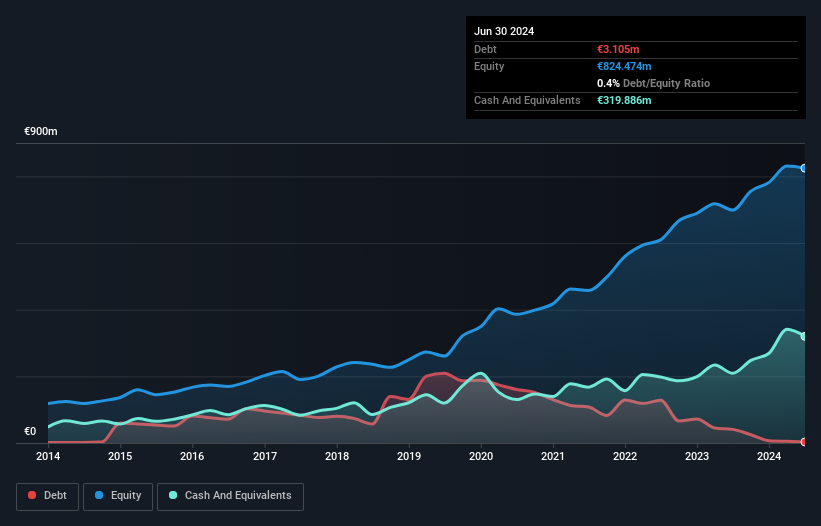Nemetschek (ETR:NEM) Could Easily Take On More Debt
Some say volatility, rather than debt, is the best way to think about risk as an investor, but Warren Buffett famously said that 'Volatility is far from synonymous with risk.' When we think about how risky a company is, we always like to look at its use of debt, since debt overload can lead to ruin. We note that Nemetschek SE (ETR:NEM) does have debt on its balance sheet. But the more important question is: how much risk is that debt creating?
What Risk Does Debt Bring?
Debt is a tool to help businesses grow, but if a business is incapable of paying off its lenders, then it exists at their mercy. Ultimately, if the company can't fulfill its legal obligations to repay debt, shareholders could walk away with nothing. While that is not too common, we often do see indebted companies permanently diluting shareholders because lenders force them to raise capital at a distressed price. By replacing dilution, though, debt can be an extremely good tool for businesses that need capital to invest in growth at high rates of return. The first thing to do when considering how much debt a business uses is to look at its cash and debt together.
View our latest analysis for Nemetschek
What Is Nemetschek's Net Debt?
As you can see below, Nemetschek had €3.11m of debt at June 2024, down from €40.9m a year prior. However, it does have €319.9m in cash offsetting this, leading to net cash of €316.8m.

A Look At Nemetschek's Liabilities
We can see from the most recent balance sheet that Nemetschek had liabilities of €470.6m falling due within a year, and liabilities of €101.6m due beyond that. On the other hand, it had cash of €319.9m and €152.0m worth of receivables due within a year. So its liabilities outweigh the sum of its cash and (near-term) receivables by €100.3m.
This state of affairs indicates that Nemetschek's balance sheet looks quite solid, as its total liabilities are just about equal to its liquid assets. So while it's hard to imagine that the €11.6b company is struggling for cash, we still think it's worth monitoring its balance sheet. While it does have liabilities worth noting, Nemetschek also has more cash than debt, so we're pretty confident it can manage its debt safely.
Another good sign is that Nemetschek has been able to increase its EBIT by 21% in twelve months, making it easier to pay down debt. When analysing debt levels, the balance sheet is the obvious place to start. But ultimately the future profitability of the business will decide if Nemetschek can strengthen its balance sheet over time. So if you want to see what the professionals think, you might find this free report on analyst profit forecasts to be interesting.
But our final consideration is also important, because a company cannot pay debt with paper profits; it needs cold hard cash. While Nemetschek has net cash on its balance sheet, it's still worth taking a look at its ability to convert earnings before interest and tax (EBIT) to free cash flow, to help us understand how quickly it is building (or eroding) that cash balance. Happily for any shareholders, Nemetschek actually produced more free cash flow than EBIT over the last three years. That sort of strong cash conversion gets us as excited as the crowd when the beat drops at a Daft Punk concert.
Summing Up
While it is always sensible to look at a company's total liabilities, it is very reassuring that Nemetschek has €316.8m in net cash. And it impressed us with free cash flow of €261m, being 115% of its EBIT. So is Nemetschek's debt a risk? It doesn't seem so to us. Over time, share prices tend to follow earnings per share, so if you're interested in Nemetschek, you may well want to click here to check an interactive graph of its earnings per share history.
If, after all that, you're more interested in a fast growing company with a rock-solid balance sheet, then check out our list of net cash growth stocks without delay.
Have feedback on this article? Concerned about the content? Get in touch with us directly. Alternatively, email editorial-team (at) simplywallst.com.
This article by Simply Wall St is general in nature. We provide commentary based on historical data and analyst forecasts only using an unbiased methodology and our articles are not intended to be financial advice. It does not constitute a recommendation to buy or sell any stock, and does not take account of your objectives, or your financial situation. We aim to bring you long-term focused analysis driven by fundamental data. Note that our analysis may not factor in the latest price-sensitive company announcements or qualitative material. Simply Wall St has no position in any stocks mentioned.
 Index Options
Index Options CME Group
CME Group Nasdaq
Nasdaq Cboe
Cboe TradingView
TradingView Wall Street Journal
Wall Street Journal